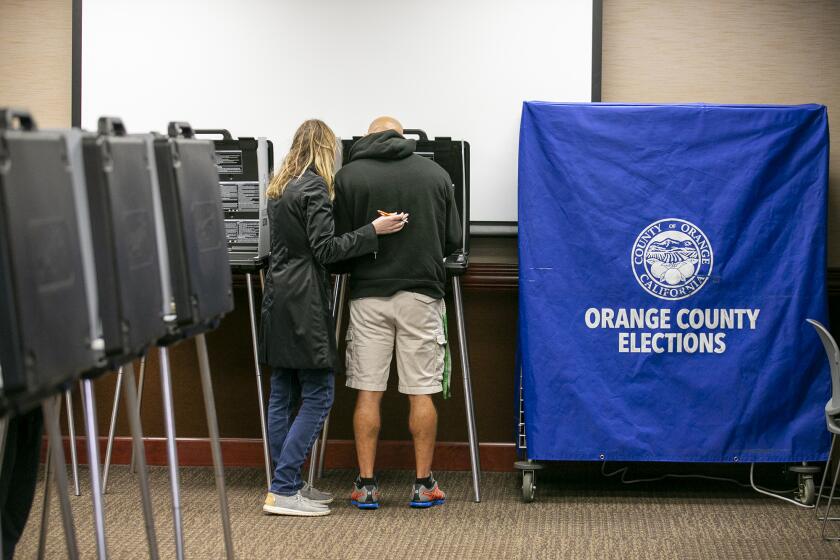Al Qaeda Aims to Disrupt Vote, Ridge Warns
Homeland Security Secretary Tom Ridge issued another general terrorism warning Thursday, saying Al Qaeda was moving ahead with plans to carry out a major attack in the United States to disrupt the November elections.
The presidential campaign of Sen. John F. Kerry (D-Mass.) promptly denounced the Bush administration for what it said was lackluster progress toward preventing attacks. A senior Democratic lawmaker complained that Ridge’s information was too vague to be of much use to citizens or law enforcement officials, and another representative accused the administration of playing politics with terrorism fears.
The politics of homeland security -- usually relegated to the background in debates over the war on terrorism -- seemed to be spilling out into the open.
Ridge denied that his statement had a political dimension. “We are basically laying out before the general public the kind of information that we’ve received,” he said. “These are not conjectures or mythical statements that we’re making, these are pieces of information that we can trace comfortably to sources that we deem to be credible.”
But the Kerry campaign’s statement ensured that Ridge’s warning would be viewed in a political context.
Administration officials “have been unable to set the most elementary requirements for protection and have no strategy to determine how best to protect our country” from threats, said Rand Beers, Kerry’s national security advisor.
Ridge said that although the Al Qaeda network had vowed to strike again in the United States, the government had not received any intelligence that terrorists were targeting the Democratic or Republican conventions this summer. The threat level, he said, would remain at code yellow, or “elevated.”
A series of recent arrests overseas, Ridge said, has shown that Al Qaeda remains capable of carrying out attacks. He added that Islamic radicals consider the March 11 bombings in Madrid, which preceded the electoral defeat of the pro-Bush Spanish government, a victory.
“We lack precise knowledge about time, place and method of attack, but along with the CIA, FBI and other agencies, we are actively working to gain that knowledge,” Ridge said. His agency also is beginning to discuss how to safeguard voting places on election day.
An intelligence official who briefed reporters after Ridge spoke said New York, Washington and Los Angeles were considered prime targets -- as were transit systems and airliners.
Pollster Andrew Kohut, director of the nonpartisan Pew Research Center for the People and the Press, said there were no polling data to indicate that Bush had directly benefited from such terrorism warnings.
However, he added, worries about terrorism could indirectly bolster the president’s standing. “The advantage is to Bush rather than Kerry,” Kohut said, “because [the war-on-terrorism message] is seen as Bush’s strong suit.”
The public gives terrorism warnings serious consideration, and attempts by either party to politicize them could backfire, Kohut added.
While agreeing with Ridge that the threat was serious, the ranking Democrat on the House Intelligence Committee questioned the usefulness of repeated, generalized warnings that leave citizens unsure how to respond.
“Warning fatigue is a real worry,” said Rep. Jane Harman (D-Venice). “The warning system we use is broken and needs to be changed. We need to give people specific enough information that they know what to look for and what to do.”
Federal law enforcement agencies now send out near-constant warnings to state and local authorities and to airports, but local officials say those also often are too general to prompt specific countermeasures.
A group that is working to register Democratic voters and defeat President Bush accused the administration of trying to make political capital out of the terrorism warning.
“We think that this is simply part of the Bush-Cheney campaign based on fear,” said Sarah Leonard, a spokeswoman for America Coming Together.
A Florida Democratic congressman voiced the same suspicion.
“Given the fact that the administration chose not to raise the threat level and provided no information to substantiate the severity of their claim, one cannot help but question whether their aim was to deflect attention from the Kerry-Edwards ticket during their inaugural week,” Rep. Robert Wexler said.
But the House Homeland Security Committee chairman, Rep. Christopher Cox (R-Newport Beach), dismissed accusations that the timing was politically motivated, noting that legislators had gotten high-level briefings this week from the FBI, the Homeland Security Department and the new Terrorist Threat Integration Center. “This is something we need to become accustomed to,” he said.
Ridge’s warning came six weeks after a similar alert from FBI Director Robert S. Mueller III and Atty. Gen. John Ashcroft. An FBI official said the bureau had not received any substantive new intelligence about an attack since then.
“The election is a focal point, but to say [intelligence indicates] any time frame before the election, we just don’t have that,” said the FBI official, speaking on condition of anonymity.
At the time of the May announcement, the FBI said it was seeking to question six men and one woman in connection with possible terrorist threats. One of them was Adam Yahiye Gadahn, a Californian. Authorities are still looking for the seven, although Ridge did not refer to them in his remarks.
The FBI’s message “was to look out for seven people,” Harman said. “Ridge didn’t make any connection with that. Different people are giving different messages with the same bottom line: vulnerability.”
Times staff writer Josh Meyer contributed to this report.
More to Read
Get the L.A. Times Politics newsletter
Deeply reported insights into legislation, politics and policy from Sacramento, Washington and beyond. In your inbox three times per week.
You may occasionally receive promotional content from the Los Angeles Times.






